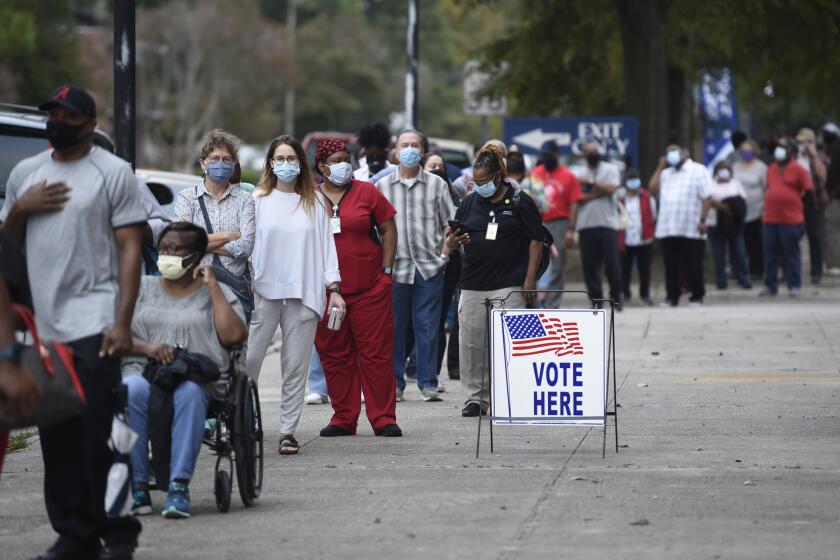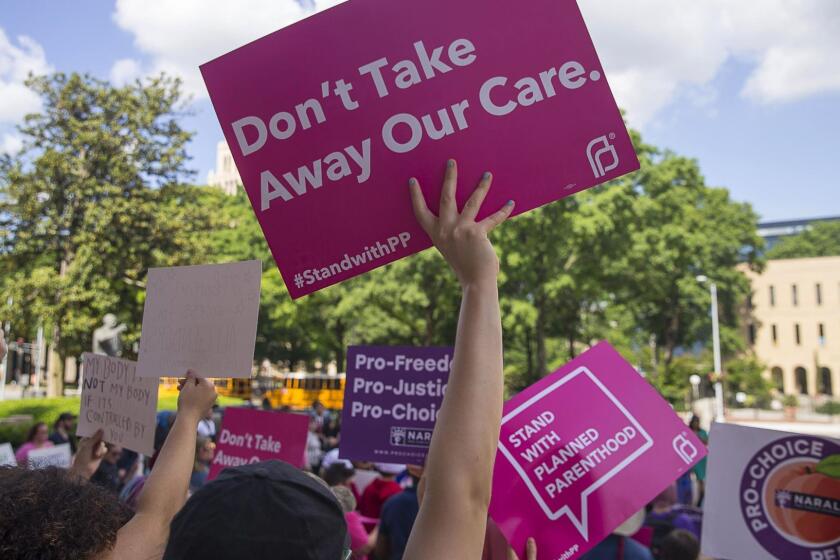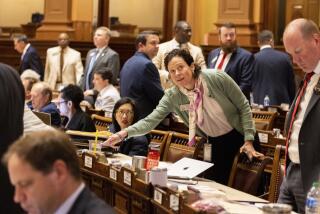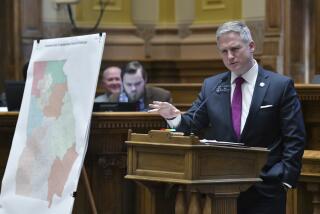Hollywood studios have been largely quiet about Georgia. What to know
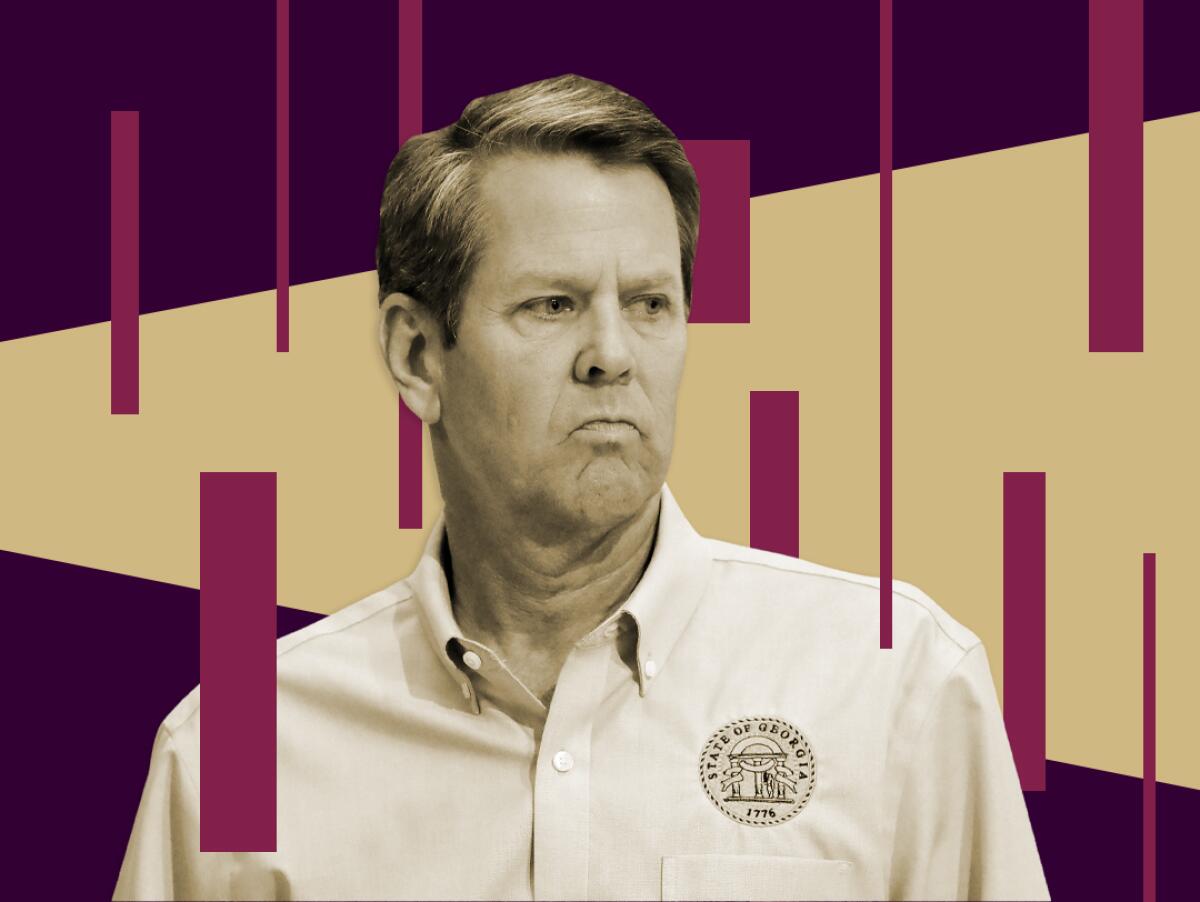
An earlier version of this article appeared in the Wide Shot, a newsletter about the business of Hollywood and everything happening in the entertainment industry. Sign up here to get it in your inbox.
After Georgia Gov. Brian Kemp signed into law sweeping new election rules, Democrats came out saying the changes would restrict voting access, especially for people of color. President Biden compared it to “Jim Crow in the 21st century.”
But the major Hollywood studios, which have previously threatened boycotts of filming in the state over controversial legislation, have been largely quiet. Why?
After all, when the Peach State passed restrictive abortion legislation in 2019, multiple filmmakers said they would no longer shoot in the state, which is a top production hub thanks to government incentives. So far, in reaction to the election law, at least one filmmaker has declared a boycott — “Ford v Ferrari” director James Mangold. That film, which was nominated for the best picture Oscar, was partly filmed in Georgia.
Inside the business of entertainment
The Wide Shot brings you news, analysis and insights on everything from streaming wars to production — and what it all means for the future.
You may occasionally receive promotional content from the Los Angeles Times.
“I will not direct a film in Georgia,” Mangold tweeted, later adding, “Georgia has been using cash to steal movie jobs from other states that allow people to vote.” Actor Mark Hamill tweeted in support of Mangold’s statement.
Among other things, the law gives the State Election Board new powers to intervene in county election offices and to remove and replace local election officials. It also includes a requirement for some form of identification for voting absentee by mail and makes it a misdemeanor to hand out money or gifts, including food and drink, to people standing in line to vote within 150 feet from a polling place and 25 feet from anyone standing in line. Another provision expands weekend early voting, which Republicans have pointed to in order to argue that they are boosting, not restricting, voting access. Here’s an explainer.
Disney, Netflix, Amazon Studios and NBCUniversal all either declined to comment or did not respond to The Times’ request for comment on Georgia’s elections overhaul, which is already facing legal challenges from voter advocacy groups and the Georgia NAACP.
In a statement, WarnerMedia parent AT&T said it is working with members of the Atlanta and Georgia chambers of commerce that support “policies that promote accessible and secure voting while also upholding election integrity and transparency.”
ViacomCBS on Wednesday voiced its opposition to the new law. “We unequivocally believe in the importance of all Americans having an equal right to vote and oppose the recent Georgia voting rights law or any effort that impedes the ability to exercise this vital constitutional right,” the media giant said in a statement.
The sweeping rewrite of Georgia’s election rules that was signed into law by Republican Gov. Brian Kemp represents the first big set of changes since former President Trump’s baseless claims of fraud following his loss to Joe Biden.
As we’ve written before, Hollywood has a lot to lose if it exits Georgia. The state is attractive to studios because it offers ideal weather and tax credits of up to 30% for films, television shows and digital features that are shot there. But this is an industry that was very vocal about racial issues after the killing of George Floyd by police. Amazon Studios released a whole documentary, “All In: The Fight for Democracy,” about Georgia’s Stacey Abrams and voting rights ahead of the 2020 election.
It may be only a matter of time. In 2019, statements from Netflix’s Ted Sarandos and Disney’s Bob Iger about rethinking Georgia production came weeks after Kemp signed the abortion law, which was later declared unconstitutional. If a major player comes out swinging in response to the voting law, expect others to quickly follow.
But many people who oppose Georgia’s elections law think that stopping the cameras would do more harm than good. Abrams herself, in a 2019 interview with the Los Angeles Times, appeared to discourage entertainment companies from boycotting the state in response to the abortion law.
“While I understand the calls for a boycott in Georgia, I’m going to follow a different path,” she said at the time. “I think the superior opportunity for Georgia, in the specific, is to actually use the entertainment industry’s energy to support and fund the work that we need to do on the ground because Georgia is on the cusp of being able to transform our political system.”
Prolific filmmaker Tyler Perry, whose studio is based in Georgia, on Tuesday said he had “been here” before, referring to the abortion law and a previous religious liberties bill that critics called anti-gay, which then-Gov. Nathan Deal vetoed in 2016.
In his emailed statement, Perry noted the gains that Democrats made in January when Jon Ossoff and the Rev. Raphael Warnock were elected to the U.S. Senate, flipping control of the legislative body.
“I’m resting my hope in the DOJ taking a hard look at this unconstitutional voter suppression law that harkens to the Jim Crow era,” Perry said. “As some consider boycotting, please remember that we did turn Georgia blue and there is a gubernatorial race on the horizon — that’s the beauty of a democracy.”
Some argue that pulling out of Georgia would be counterproductive to the cause and harm workers. Bernice King, chief executive of the Martin Luther King Jr. Center for Nonviolent Social Change, tweeted: “Please stop the #BoycottGeorgia talk. That would hurt middle class workers and people grappling with poverty. And it would increase the harm of both racism and classism.”
She later clarified that she was not opposed to boycotts in general, which have often been effective tools in the fight for civil rights. “I encourage us to consider how a hashtag about boycotting a state may distract from strategic boycotts with maximum results for justice,” she wrote.
Atlanta-based film critic Matt Goldberg, an editor with movie website Collider, suggested a better tactic would be to donate to organizations that advocate for voting rights.
Notably, when major filmmakers called for boycotts in 2019 over the so-called heartbeat abortion bill, local production workers balked, saying their livelihoods would be harmed. Franklin Leonard, founder of the Black List survey of unproduced screenplays, responded to Mangold’s tweet by asking him to reconsider.
“While I understand the instinct, I hope you’ll reconsider and seek guidance on the best way forward from those who have been doing the work on the ground there - Black women in particular,” wrote Leonard, who is from Georgia.
They watched in dismay as their Republican governor signed a law outlawing almost all abortions.
More to Read
The biggest entertainment stories
Get our big stories about Hollywood, film, television, music, arts, culture and more right in your inbox as soon as they publish.
You may occasionally receive promotional content from the Los Angeles Times.
